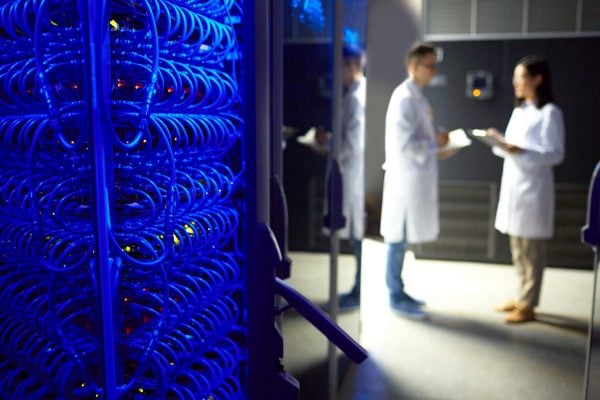As we move into the future, the prospect of machines replacing human beings in many industries is becoming increasingly common. Already, we’re seeing automated processes being handled by machines rather than people, allowing for businesses to achieve a level of consistency in manufacture. Across many industries, it looks like automation is the direction that we’re moving towards. As robotics gets even better, we might even start to see more sophisticated machines replace humans in jobs which we previously thought were safe. However, machines universally replacing people won’t happen for a long time. While the robots slowly move towards global domination, let’s take a look at 10 future proof jobs and careers that they won’t be snatching from you any time soon.
Future Proof Jobs – Education
While machines might be increasingly more capable of doing a multitude of human jobs, teaching won’t be one of them any time soon. Computers can gather information and store incredible amounts of data, but it takes a human touch to be able to convey it to a class of students. People will still need to be able to do Maths, English, Science and Languages, so they’ll always need teachers to guide them.
Teachers – both in primary and secondary education – are constantly in demand, and this will likely remain the case going forward. The average salary for a teacher is approximately £28,000 per year. The process for becoming a teacher is as follows:
Step One – Get at least a 2:2 at degree level.
Step Two – Pass the QTS Literacy and Numeracy skills tests.
Step Three – Apply to a programme which offers teacher training, such as a PGCE, SCITT, School Direct, or Teach First.
Step Four – Complete your teacher training (minimum of one year).
Step Five – Apply for teaching roles in schools.
Click here to find out more about how to become a teacher.

Future Proof Jobs – Chef
Robot chefs and butlers might appear in your favourite sci-fi movies, but we’re not likely to see machines replacing humans when it comes to preparing quality food for a long time. Not only do chefs need to have a great sense of smell and taste, but they must also possess excellent dexterity and time-management skills.
Chefs are in high demand and earn an average of approximately £18,500 per year. You’ll need to study for a professional chef diploma before you can start working as a chef.

Future Proof Jobs – Human Resources
Human Resources jobs are protected from being taken by robots because the personal side of a human being will always be necessary to find the right talent for a role. Likewise, Human Resources teams are often responsible for making sure that work environments are safe, healthy, and allow for employees to reach their fullest potential.
You’ll need one of the following to get yourself a permanent role in an HR department:
a) A university degree which will allow you to begin a graduate scheme in HR.
b) An HR apprenticeship.
c) An HR internship.
With at least one of these, you should be able to make your way into an HR career. On average, those who work in HR earn approximately £36,000 per year.

Future Proof Jobs – Logistics
In recent years, industries such as retail have moved drastically in the direction of online stores and next-day deliveries. Websites such as Amazon have popularised this method of receiving goods, and there are bound to be advancements in the near future. However, the foreseeable future will require logistics experts who can manage and co-ordinate these services to make sure that everything runs smoothly.
Graduate schemes are available for jobs in logistics, transport, and supply chain. Workers in the logistics sector earn an average of approximately £43,000 per year.

Future Proof Jobs – Data Scientist
As the use of machines to keep track of metrics all over the world is increasing, so too must the demand for those who can handle this data properly. A machine can gather information extremely well, but currently there needs to be a human being involved to interpret the data in a way which applies to people. In the far future, this might well change – we might be under the guidance of super intelligent machine overlords – but for the foreseeable future, a person is required to make sense of raw data.
As a data scientist, this would be your role. In order to become a data scientist, you will probably need the following:
• A background in statistics;
• Experience in data aggregation;
• Strong Maths skills;
• Fluency in some programming languages (e.g. Python, C#). The exact language will differ depending on who you’re applying for a role with.
On average, data scientists earn approximately £55,000 per year.

Future Proof Jobs – Cyber Security
With more nations and companies becoming increasingly more reliant on computers and the internet, cyber-attacks have become a lot more common. The likelihood is that this will continue as we naturally move closer towards full reliance on technology. Therefore, the demand for cybersecurity experts will likely continue to rise. Cybersecurity firms will need to keep recruiting in order to meet this demand, which means that there’s an opportunity for you.
In order to get a job in cyber security, you’ll need to have good experience in different security architectures and the ability to work well in IT. Preferably, you’ll also possess a background in other kinds of security as well, so that you have the correct mindset for cyber security.
The average salary in the cyber security sector is approximately £30,000 per year.

Future Proof Jobs – Healthcare
Healthcare is a huge field, and isn’t in danger of being run by androids any time soon. While machines will become increasingly prevalent in the way medicine is administered and people are treated, there will always be the need for a human perspective, either from a doctor or nurse. In particular, nursing will always be valuable due to that element of humanity – nurses need to be able to tend to patients on a medical level, but also on a very social and personal one.
Roles in healthcare take various forms, and therefore the processes for getting into a career in healthcare is extremely varied. If you want to become a doctor, you must complete a degree in Medicine, and undergo multiple years of training in order to become fully qualified. Nurses must complete a degree in Nursing. Other roles, such as paramedic, will require relevant qualifications and training.
On average, healthcare professionals earn approximately £26,000 per year. Fully-qualified doctors will earn quite a bit more, however.
If you are interested in becoming a paramedic, take a look at our expert guide: How to Become a Paramedic.

Future Proof Jobs – Marketing
Marketing is a sector that requires individuals who are able to think about how other people think, as well as how they behave. Someone in marketing needs to be able to understand the explicit or implicit desires of people in society. Then, they need to be able to play upon them to sell a product. In addition, they need to be creative, since a lot of the most successful marketing campaigns are ones which have been thought of outside of the box.
Currently, machines are pretty poor at both understanding what human beings want, and being creative. While computers are great for aggregating data and algorithms can be useful for marketing, there still needs to be people on one end coming up with great ideas and executing them effectively.
Individuals who work in the marketing sector earn an average of £25,000 per year.

Future Proof Jobs – Construction
Machines have been used in the construction sector for decades now, and it looks like their prevalence will continue to increase. However, there will still be the need for human architects, chartered surveyors, and carpenters to work alongside technology. Of course, you’ll need to be able to work with computers and other machines, but your own job won’t be taken by them.
A job in the construction sector can take many forms. If you wish to become an architect, you’ll have to complete an Architecture degree. This will take five years to complete.

Future Proof Jobs – Programme/Software Development
While machines are vital for many industries, they aren’t quite capable of programming themselves from scratch. Experts in programming and software development are already sought-after, but will likely become even more valuable in the future as companies look to automate more processes.
To get a role in programming and software development, you will likely need some of the following:
• A degree in a related field (e.g. software engineering or computer science);
• Experience in programming and software development (potentially in solo projects);
• Fluency in multiple programming languages (e.g. Python or C#).

Conclusion
The main thing that all of these careers have in common is that they all require skills that computers and machines probably won’t acquire for a long time. Whether it’s a human touch, a creative mind, the ability to programme software, or the skills to keep machines safe and secure, there are plenty of different ways you can make yourself future proof by finding future proof careers.